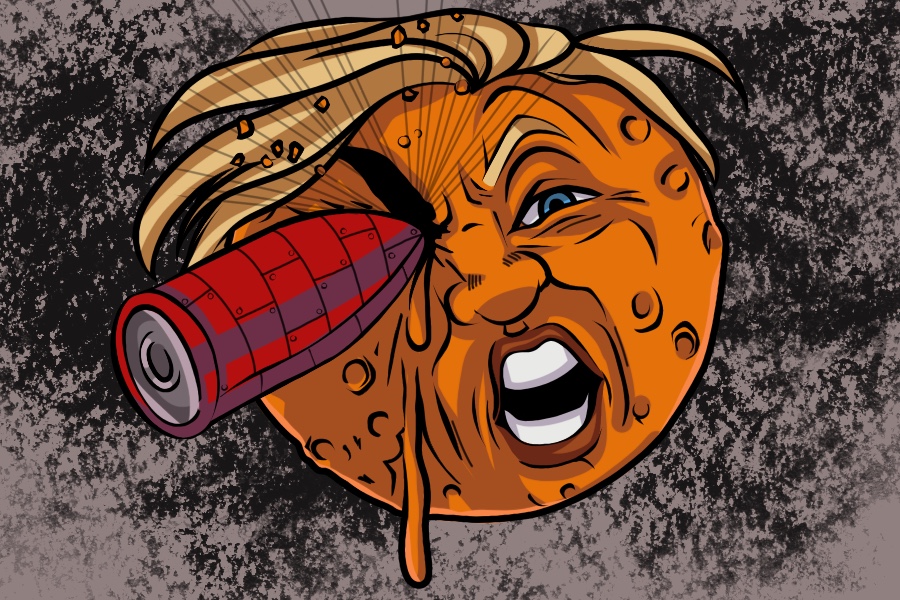
Leaving the deal could result in yet another war in the Middle East
 Iran-U.S. relations have been characterized by overt hostility for decades, with both countries affirming rather antagonistic positions with one another. In Iran’s eyes, the U.S. is a powerful and aggressive force in the Middle East. In 1955, the U.S. assisted the U.K. in overthrowing a democratically elected leader in favor of strengthening the monarchical rule of Shah Mohammad Reza Pahlavi. The U.S. has also propped up a multitude of dictators in the Middle East, aside from the royal dictatorship of the Shah. From the perspective of the U.S., there is reasonable fear of Iran’s extension of power, as they have funded Hezbollah, backed Bashar al-Assad’s regime, declared destruction upon Israel and conducted relatively frequent street demonstrations in which they chant “death to America.”
Iran-U.S. relations have been characterized by overt hostility for decades, with both countries affirming rather antagonistic positions with one another. In Iran’s eyes, the U.S. is a powerful and aggressive force in the Middle East. In 1955, the U.S. assisted the U.K. in overthrowing a democratically elected leader in favor of strengthening the monarchical rule of Shah Mohammad Reza Pahlavi. The U.S. has also propped up a multitude of dictators in the Middle East, aside from the royal dictatorship of the Shah. From the perspective of the U.S., there is reasonable fear of Iran’s extension of power, as they have funded Hezbollah, backed Bashar al-Assad’s regime, declared destruction upon Israel and conducted relatively frequent street demonstrations in which they chant “death to America.”
One substantial hallmark of the Obama administration was the Iran Nuclear Deal, which was, and is, widely believed to be the first step to an amicable relationship. Given that Iran is a formidable presence in the Middle East, successful developments in their nuclear weapons program would likely result in catastrophic consequences, with a ripple effect on an international scale. Under this agreement, the U.S., U.K., France, Russia, China and Germany have agreed to lift sanctions on Iran and, in return, Iran has discontinued its nuclear program. The deal limits Iran’s enrichment capacity and research and development of uranium for 15 years. The deal also allows for routine and intrusive inspections conducted in Iran to ensure it uphold its end of the deal. Inspectors from the International Atomic Energy Agency will continuously monitor Iran’s nuclear program as well as ensure that fissile material isn’t secretly taken to an alternative location to build a bomb. If there is any failure to comply, sanctions will be re-imposed.
With the inauguration of Donald Trump, however, no deal made under Obama is safe. Withdrawing from both the Paris Agreement and the Trans-Pacific Partnership, Trump’s eyes are now fixated on abandoning the nuclear deal.
In all fairness, this agreement is riddled with flaws. While Iran has respected the agreement through the discontinuation of nuclear developments, it has emerged as a threat in alternative ways. After the deal was secured, Iran continued to engage in hostile activities, including swarming U.S. navy ships — which is not technically a violation of the deal. Recently, however, Iran has discontinued, to a degree, engagement in such activities, and some credit this to Trump’s tougher approach with the Middle East, contrasting to what some believe was a weak approach to the region by Obama.
But this may not be enough. Former Secretary of State John Kerry previously stated that part of the agreement entails Iran forgoing its hostile position toward Israel — which it has not honored.
Presently, Iran appears poised to combat Israel as evidenced through its attempts to turn Syria into a forward air base against Israel. Prior to this, it had used its proxy, Hezbollah, to fight Israel for the nation. It has also continued to develop and test ballistic missiles and plans to unveil new missiles in its annual military parade.
That being said, the deal is working. Thus far, inspectors haven’t found Iran to be in violation of the terms. Furthermore, withdrawing from the deal could yield severe diplomatic repercussions. Abandoning the deal would insinuate to the rest of the world that respecting our international agreements is dependent on who holds presidential office. Seeing as we live in a democratic society with a new president every four to eight years, we would essentially send the message that our word is tempermental — likely making future deals more difficult to forge. If the deal is discontinued, the outcome has already been guaranteed by Iran: the immediate recommencement of its nuclear program. Rising tensions in the Middle East, specifically between Iran and Israel, also make for an incredibly volatile environment in which nuclear weapons are not beyond the possibility of usage.
It’s possible that we, in the West, are pretending we’re at a peaceful resolution, while Iran is preparing to fulfill what it believes is God’s desire to destroy Israel. It’s also possible that an abandonment of this deal, and, consequently, Iran’s recommencement of its nuclear program, could lead to yet another world war.
It’s crucial that one key aspect of Iran is recognized: Iran is more than just its regime. Iran is its people, who are notably pro-Western (despite death chants). It has been argued that the Iran we see in 15 years will be far more liberal. If this is the case, then abandoning the deal could curtail potentially liberal developments in Iran. When the time comes to renew the agreement, under a hopefully more liberal rule, preferable and more peaceful terms may be reached, which could significantly alter the fate of the war-torn region. After decades of meddlesome intervention, it’s time we give the Middle East a chance to thrive. That being said, harsher enforcement of the terms unrelated to nuclear developments should be instituted.
It’s imperative that, in either decision Trump makes, we understand that we are discussing a possible war. Throwing away a deal such as this does not come without consequence. Forsaking the deal could result in both diplomatic and security issues, which Trump currently appears unprepared to deal with. This deal is not like that of the Paris Agreement or the Trans-Pacific Partnership — this is about inhibiting the use of a weapon that guarantees catastrophe, by a country that guarantees instability. There’s no plan for the aftermath of this possible fallout, no guarantee that Iran will not continue its nuclear program. If Trump is going to terminate the agreement on May 12, he must come prepared.
Written by: Hanadi Jordan — hajordan@ucdavis.edu
Disclaimer: The views and opinions expressed by individual columnists belong to the columnists alone and do not necessarily indicate the views and opinions held by The California Aggie.



